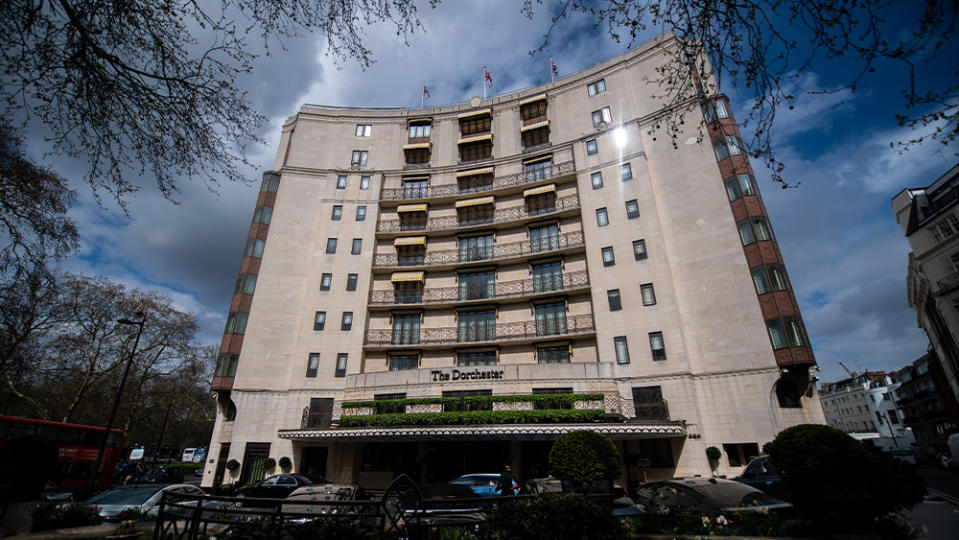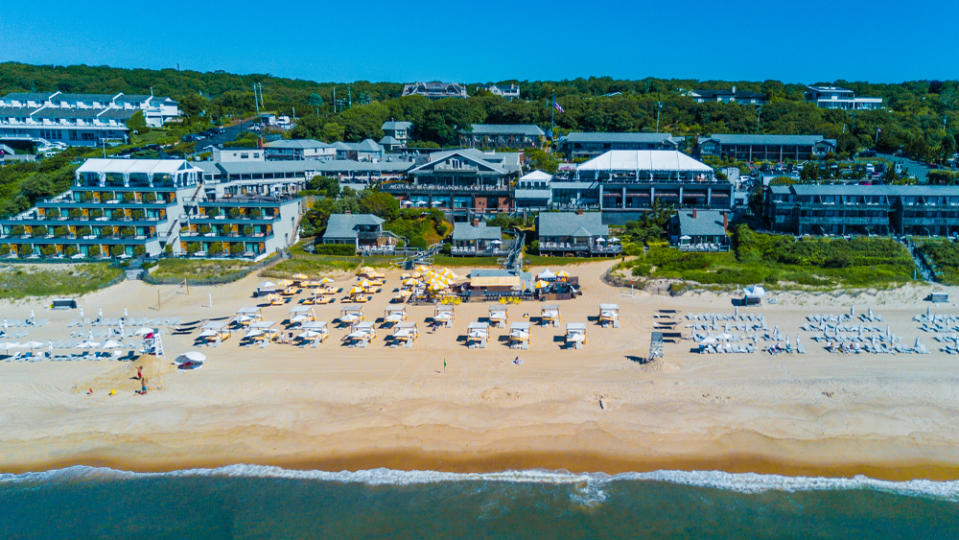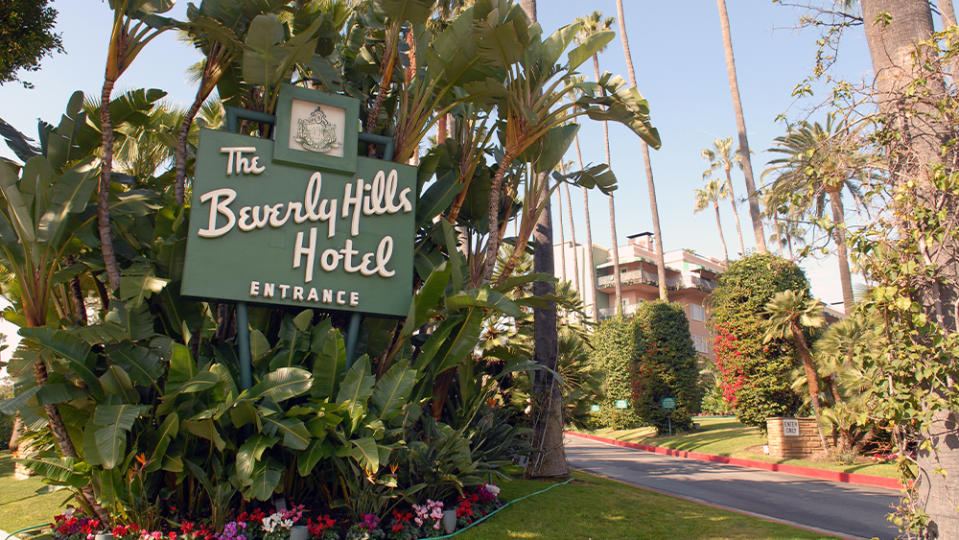Money for Nothing? Why 5-Star Resorts Are Charging Guests Hundreds in Junk Fees

She only noticed it because of an admin snafu. A well-known travel advisor was poring over a client’s folio after a stay at the Dorchester in London. There was a question as to whether a credit promised had been issued correctly. The family of seven was on a lengthy trip to Europe, skipping between London, Italy, Turkey, and Greece, combining a cruise with several extended five-star hotel stays, spending around $300,000 or so. The travel specialist was startled: the credit had processed, but what was this extra, £1,200 (around $1,530) that appeared as a line item after they’d checked out in London?
The agent, who requested anonymity to protect her professional relationships, was shocked.
More from Robb Report
How a California Couple Almost Got Away With a $1 Billion Ponzi Scheme That Ensnared Warren Buffett
The Best Things to Do in Aspen This Winter-When You're Not Actually Skiing, That Is
“I saw charges for room dining, spa services, gratuities—and then there was this accommodation service charge. We thought the clients were entirely prepaid, other than spa or in-room dining, so I asked about it,” she said. “The hotel came back immediately and said ‘Oh we’ll take that off if the clients wish.’”
Puzzled, she checked the small print on the Dorchester Collection website: sure enough, for each of its hotels, there’s now an added, optional fee of 5 percent on every night’s stay.
Her amazed client sums up the rogue line item best: “It seems they’re rather aggressive in their charging, and not very aggressive in being transparent.”
Such tacked-on fees are a growing scourge for travelers who stay in five-star hotels, and the justification for it varies.

In the Dorchester Collection’s U.K. hotels it’s a “discretionary service charge,” but it’s an “employee health and benefit surcharge” at the company’s Beverly Hills Hotel and Hotel Bel-Air in Los Angeles.
It’s a practice known as “drip pricing” and in 2018 (the most recent available data) the hotel industry racked in $2.9 billion in junk fees, according to Consumer Reports.
Ostensibly, these tacked-on charges are amenity underwriters for pools, gyms, and more. But some are levied for reasons most travelers might find curious, at best. At the N.Y.C. properties of eco-champion 1 Hotels, for example, such a fee covers the filtered water taps in every room, among other things, while the hikes and meditation trails at West Virginia’s Greenbrier are underwritten by a $39 fee. Calculations on the average fee vary: one estimate put it at $26 per night, up 3 percent per year, while another said it was closer to $42.41, or around 11 percent of the overall cost to stay at a given property (the average rate in June 2023 worldwide in the luxury sector was $346.79, per hospitality data provider CoStar).
Increasingly, especially at the higher end of the market, hotels are opting not for a flat rate fee, but a percentage charge, which can easily result in hundreds of dollars in fees.
A spokesperson for the Dorchester Collection confirmed that the 5 percent fee was introduced in January 2022, starting first in the U.K. and then spreading to the rest of the portfolio.
“Given our company’s focus and commitment to employee wellbeing, 100 percent of the charge is distributed to our staff in our European hotels. In our U.S. hotels, the discretionary employee health and benefit surcharge helps to ensure that our employees have access to the best in class medical health benefits. The different names in different destinations reflect each country’s legislation,” the spokesperson said via email.
A further puzzlement for consumers is that these new fees come at a time when the luxury travel market is boiling over. The average daily room rate, or typical rate charged, at a luxury class hotel stateside this June was $363.48, more than 27 percent higher than in June 2019, pre-pandemic. Worldwide, the luxury sector saw rates rise 34 percent over the same period. One five-star hotelier told Robb Report that he’d even deactivated the revenue management software that controlled pricing at his flagship property.
“Usually, when the rates rise, demand falls,” he said. “But we saw demand increase no matter how much we let the rates climb, and I was concerned about delivering value for money, so we switched it off.”
Most traveler advisors consider it a worrisome trend. It’s yet another thing they need to warn their clients to anticipate. Robb Report spoke to several high-end agents about it, though most requested anonymity for fear of reprisals from hotels. The Dorchester Collection has become infamous among them for the 5 percent fee.
“They’re the ones who are really irking us, and it’s double-dipping at its worst. Their rates are already at the top, top echelon, but this is absurd, and most of our clients are not even made aware of it,” said one West Coast-based specialist.
Yet those hotels aren’t alone in their category, as Red Savannah’s Edward Granville, one of Robb Report’s Travel Masters, explained.
“We have heard of a number of European properties trying to sneak something like this onto bills,” he said. “We believe the charge should be queried and rejected if it has not been very clearly pre-advised.”

The Hyatt-operated ultra-luxe spa Miraval charges a 25 percent fee per night, while Montauk-based Gurney’s opts for a 20 percent fee.
For a superior room ocean view at Gurney’s, which can cost as much as $1,515 for one night midweek in August, that adds more than $300 to the stay. The property’s spokesperson told Robb Report that it has been charged in this way since 1972.
“This fee covers a wide range of luxury amenities, including access to the bathhouse, seawater pool, and state-of-the-art fitness offerings at the Seawater Spa, including daily workout classes, Gurney’s fully serviced private beach club, complimentary valet parking, kids club, shuttle service and more,” the spokesperson said, via email. “The resort fee is disclosed through every step of the booking process in order to be fully transparent as it provides guests exclusive access to elevated facilities and resort experiences.” (The fee is specified once a would-be guest clicks through to book on the hotel’s website, but the headline rate touted in search results merely adds the proviso “excluding taxes and fees.”)
How, then, did we end up with this fee farrago?
Gurney’s may have had a head start, but most resort fees began to appear in the late 1990s and have been snowballing ever since, surging over the last decade. Henry Harteveldt, a travel industry analyst and founder of Atmosphere Research Group, says that stealthy fees are often added during hard times, like the Great Depression and the pandemic, but rarely removed.
“I’m calling bullshit on all of this,” he said. “When you are a five-star hotel you’re charging a premium not only for your accommodations, but for the various services you provide. If you nickel and dime your customer with these discretionary surcharges, they don’t like it. Many of their customers are successful business people. They look at this and say, ‘I would never think of doing it in my business.’ When you go to Neiman Marcus to buy a sable coat, the store doesn’t add on a service charge to cover its employees’ healthcare. It’s already factored into the price you pay for the goods.”
There are reasons other than a recession hangover driving such drip pricing, adds Dave Grossman, who runs the travel site Miles Talk, which specializes in reward travel.
“They want to look cheaper in the OTAs, or online travel agents,” versus competitors, Grossman said., “But they also want to avoid paying commission on that part to them.”
Put simply, if the room rates are hiked by, say, 20 percent, that extra profit is vulnerable to commission-sharing, whether an online agent or a human specialist. If a resort fee is added at checkout it remains pure profit that can’t be siphoned away by partners.
He recalls an incident in Italy where a friend saw that a service charge was tacked onto a bill, in Italian. That pal, an opera singer, happened to speak Italian, and saw the line item explained as “If it sticks, it sticks”—and successfully challenged its removal (see a recent issue in Italy of a similar nature, whether a €2 charge to cut a sandwich or the same amount for an extra plate).
“They’re seeing how many people object, and how they do it—does it make them mad, or do they just say ‘I’d prefer not to pay’?” Grossman says of this approach, noting that line items suggesting the extra fee covers, say, employees’ healthcare are particularly egregious, maximizing embarrassment when resisting a supposedly optional upcharge.

However, there are occasions when fees might be value for money, cautions Grossman, recalling his own stay at the St. Regis in New York five years ago. Its “destination amenity fee” of $50 per night included a $25 on-property F&B credit, $50 per day for laundry or dry cleaning, and a pair of museum tickets.
“It’s the exception to the rule, though,” he said.
So what’s a luxury traveler to do? Lauren Wolfe, a consumer rights lawyer and founder of KillResortFees.com is spearheading a campaign to make hotels disclose all fees and add-ons more transparently, including before booking.
“Why would you nickel and dime people at the top end of the market, it’s truly nonsensical,” she said. “At a luxury property, it seems cheap and gross to me.”
Wolfe says there have been clampdowns before, notably a 2012 warning from the Federal Trade Commission, which knuckle-rapped 22 hotels for their evasive pricing. Since then, some states have tried to unilaterally address the issue. Marriott settled with Pennsylvania over the disclosure of resort fees in 2021, but the hotelier was so sluggish in enacting the agreement, the state’s attorney general fined it $225,000 earlier this year. Karl Racine, the former attorney general of Washington, D.C., has been particularly aggressive on this topic, Wolfe continues.
“If you file a complaint about resort fees to his office, they will make sure they are refunded,” she said. “I live here and they have very good consumer protection laws. Not every state does.”
Best still, surreptitious charges might be outlawed at a Federal level, at least if the Junk Fee Prevention Act comes into law. Introduced by senators Richard Blumenthal and Sheldon Whitehouse, it would outlaw hiding the full price of a room until checkout or the last booking page. The idea has full White House support, with President Biden even mentioning junk fees in his State of the Union address. There’s no word, though, when or if this will become law, and the issue remains troubling until then, warns Wolfe.
“I’m concerned, because I think hotels are trying to be as bold as they can right now before it’s reined in. They know the beginning of the end is happening, and they want to charge as much money as possible now.”
Best of Robb Report
The Ultimate Miami Spa Guide: 15 Luxurious Places to Treat Yourself
The 7 Most Insanely Luxurious Spas in the World, From Tokyo to Iceland
17 Reasons the Caribbean Should Be at the Top of Your Travel Itinerary
Sign up for Robb Report's Newsletter. For the latest news, follow us on Facebook, Twitter, and Instagram.

